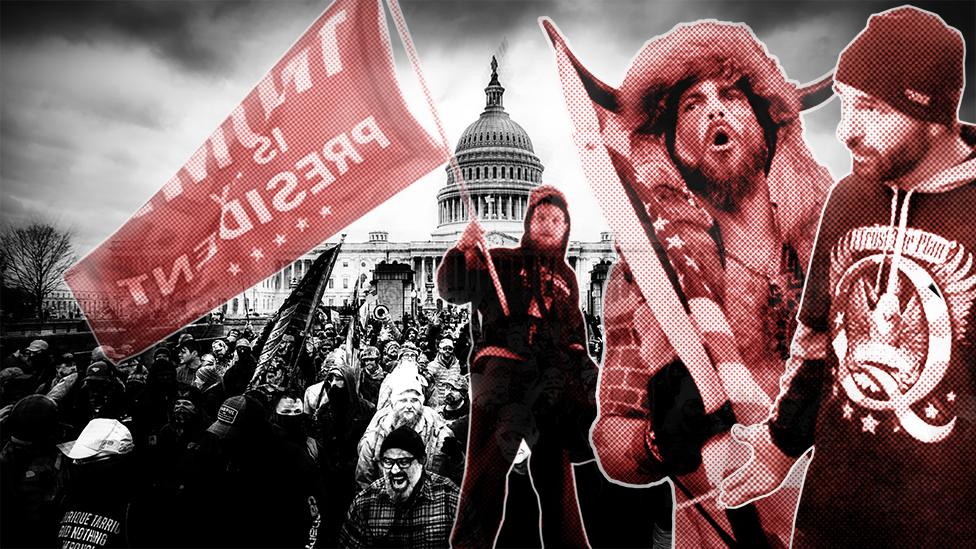US midterms: The election deniers running to control 2024 vote
- Published
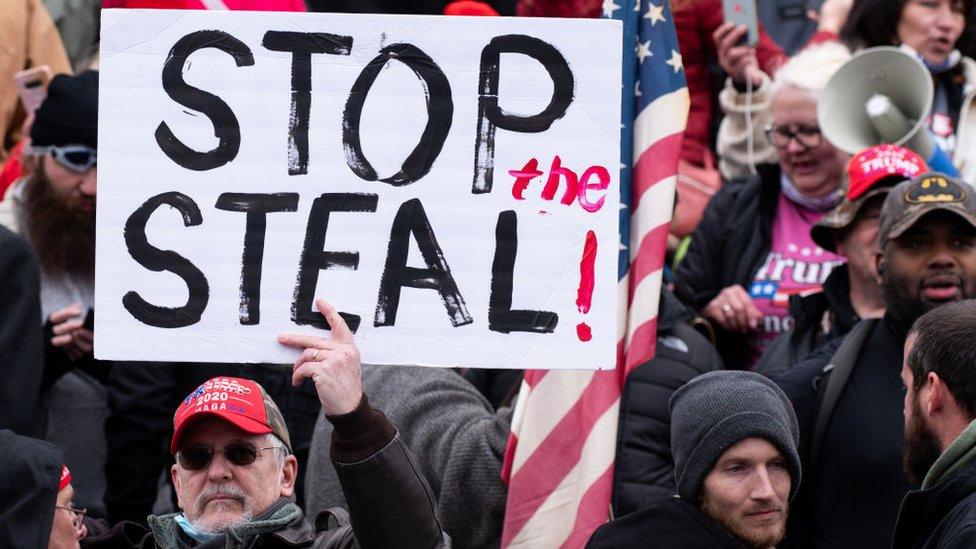
A coalition of candidates who have falsely claimed the last US election was stolen is running for office - this time in a bid to control the 2024 vote in key swing states. The group's founders also have deep connections to another conspiracy theory, QAnon.
When Donald Trump called him up onto the stage at a rally in Nevada last month, Jim Marchant seized the opportunity to hammer home his campaign message.
"We have something in common," he told the raucous crowd, with the former president standing beside him. "President Trump and I both lost an election in 2020 because of a rigged election."
While both men continue to spread false theories about their past defeats - the Nevada businessman lost his race for Congress - Mr Marchant also made clear he's looking to the future.
"When my coalition of secretary of state candidates around the country get elected we're going to fix the whole country and President Trump is going to be president again in 2024," he declared.
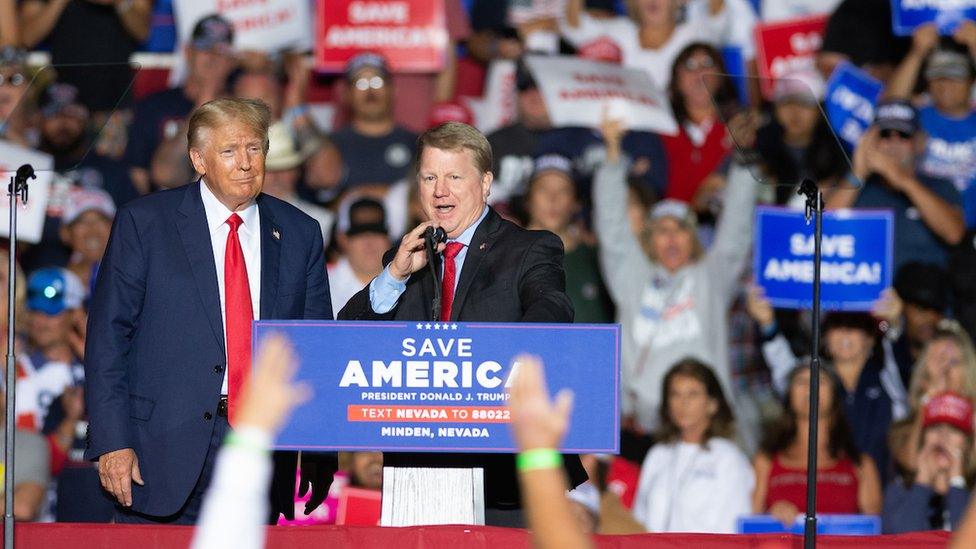
Mr Trump beamed as his supporters roared their approval. But experts warn that having partisan election deniers responsible for setting election rules - and in some cases, certifying the results - is dangerous for democracy.
The SOS coalition
Seven members of Mr Marchant's political group called the America First Secretary of State (SOS) Coalition, external will be on the ballot in November's midterm elections. As the name implies, they are targeting secretary of state positions (two Republican candidates for governor, in Pennsylvania and Arizona, also signed up).
These normally obscure roles are distinct from the US secretary of state, a powerful job equivalent to foreign secretary. At the state level, secretary of states have a variety of bureaucratic duties, mostly to do with registering and licensing. But in most states, they also supervise elections.
Rachel Orey, from the Elections Project at the Bipartisan Policy Center, says these SOS candidates are further eroding trust in the electoral process, and risk sowing chaos if there's another close race for the White House in 2024.
"I could absolutely see another January 6th happening at the state level," she says, referring to the 2021 riot at the US Capitol by a mob of Trump supporters.
The position of secretary of state was highlighted in 2020 when a recording emerged of Mr Trump asking Brad Raffensperger in Georgia to "find" 11,780 votes to overcome his margin of defeat in the state. Mr Raffensperger, a Republican, resisted the president's efforts, and Georgia's votes ultimately landed in Joe Biden's column.
Would that happen if a similar situation arises in a different state next time?
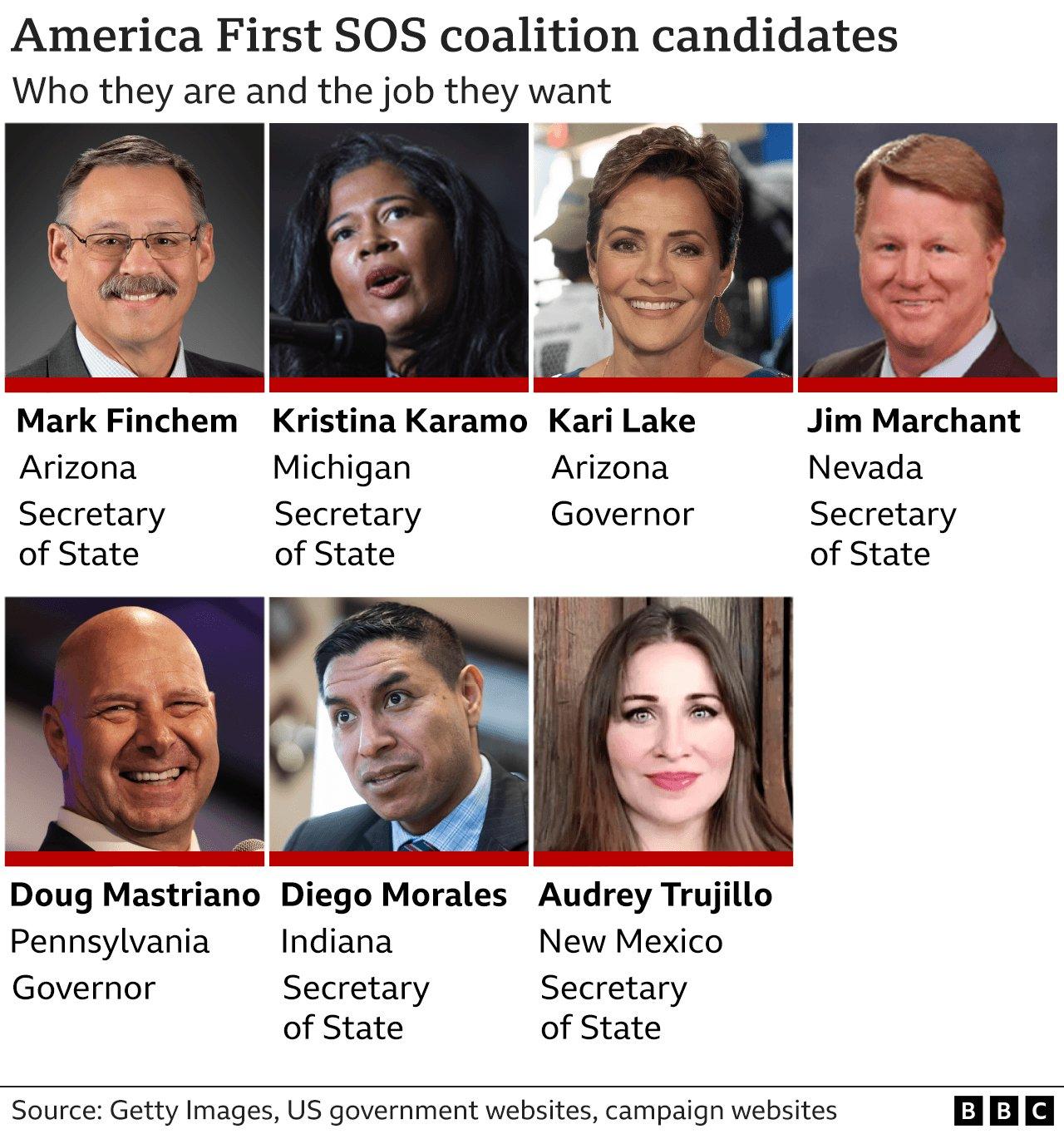
The SOS coalition is one element of a much wider movement that has swept the Republican Party since the Trump-backed Stop the Steal campaign after the 2020 election.
Polls have consistently indicated that around two-thirds of Republicans have doubts about the legitimacy of Joe Biden's victory - despite the fact that dozens of lawsuits have been thrown out and there's no evidence of any widespread fraud that would have changed the outcome.
Among 595 Republicans running for state-wide or federal office, 308 have raised doubts about the validity or integrity of the 2020 election, according to an analysis by the BBC's US partner CBS News.
The level of commitment to the false claim does vary - and many candidates backed away from talking about it once they'd secured the all-important Trump endorsement and won the Republican nomination in their race.
But even a much narrower definition of election denial shows broad acceptance of false claims. A BBC analysis of Republican candidates running for Congress or governor found that 175 - or 35% - have fully and publicly denied the outcome of the 2020 election.
These hardcore deniers are not just fringe outsiders. A majority are running in heavily Republican districts or are in competitive races.
Some have made election conspiracy theories the cornerstone of their campaigns.
Mark Finchem, the Republican candidate for secretary of state in Arizona, told the BBC he didn't believe it was possible for a Democrat to win in his state.
Katty Kay challenges Mark Finchem over his false claims the 2020 election was stolen.
And when the BBC challenged Kari Lake, the woman hoping to become the next Arizona governor, about her unfounded 2020 claims about hundreds of thousands of phony ballots, the Republican insisted - without any proof - that key evidence had been withheld by the government.
The America First SOS coalition candidates say they just want fair elections. They've agreed on rules changes they'd introduce to prevent fraud - requiring voters to show identification at the polls, eliminating mail-in ballots, and an "aggressive voter roll clean-up".
Bret Schafer, from the nonpartisan Alliance for Securing Democracy, says it's legitimate to discuss election security and to debate potential changes to the system, although he believes the coalition's proposed measures are unnecessary and will simply make it harder for Americans to vote.
"But we're seeing the injection of conspiratorial narratives into the conversation around security," he says. "And an election administrator who has bought into or elevated those who push wild conspiracy theories is fundamentally dangerous."
Jim Marchant - the candidate who shared the stage with Donald Trump last month - doesn't limit his allegations to the 2020 election. He has claimed that all Nevada elections since 2006 have been rigged, with elected officials installed by a "deep state cabal".
And in a campaign advert posted in October, he even suggests that Democratic leaders like Nancy Pelosi and Chuck Schumer only won their elections due to ballot stuffing funded by liberal donor George Soros. The reality, of course, is that they are popular politicians representing heavily Democratic areas.


Experts say conspiracy thinking in one area easily spills over to others.
"Where conspiracy worlds used to be very siloed they're now all mixed together," says Mike Rothschild, author of The Storm Is Upon Us: How QAnon Became a Movement, Cult, and Conspiracy Theory of Everything.
"So you're just as likely to believe that the election was stolen… as you are to believe that ivermectin is the cure for all diseases and that Covid-19 is a hoax," he says.
Which brings us to how the SOS coalition was formed in the first place.
Mr Marchant was instrumental, as he explained at a conference in Las Vegas a year ago. "We need to take back secretary of state offices across the country… not only did they ask me to run, they asked me to put together a coalition of other like-minded secretary of state candidates."
The "they" Mr Marchant referred to was a group of unnamed Trump lawyers and supporters. But at the same conference, he did specifically pick out one person crucial to the formation of the coalition - a QAnon influencer who goes by the pseudonym Juan O Savin.
QAnon connections
Juan O Savin has been named in press reports as Wayne Willott, a private investigator who lives in Washington state.
He appears on fringe YouTube podcasts, talking from behind the camera and often showing a shot of his boots or the view outside his window. He pushes elaborate conspiracy theories rooted in QAnon - the wide-ranging, unfounded theory that says that former President Trump is waging a secret war against elite Satan-worshipping paedophiles in government, business, the Democratic Party and the media.
At the conference last year, the crowd erupted in applause when Mr Marchant mentioned Juan O Savin. Neither Mr Marchant nor Mr Willott responded to requests for comment for this story.
While the seven candidates have not campaigned explicitly on QAnon ideas, several have attended QAnon and conspiracy-themed events.

Hear more
QAnon at the ballot box, from Trending on the BBC World Service. Download the podcast or listen online

This October, four of members of the coalition - Mr Marchant, plus the secretary of state candidates for New Mexico, Arizona and Michigan - attended a forum where Juan O Savin also spoke.
After Savin concluded a rant about Mr Soros, Audrey Trullijo, who is running in New Mexico, took the microphone back, according to the Daily Beast, external. "Let's hear it for Juan O Savin," she told the crowd. "Is he awesome?"
Another SOS coalition candidate, Kristina Karamo of Michigan, appeared on a QAnon podcast in 2020 pushing conspiracy theories about elites drinking blood and participating in satanic rituals, according to Vice News, external.
The movement's online activities have fragmented, but experts say it's still affecting politics - in the US and elsewhere.
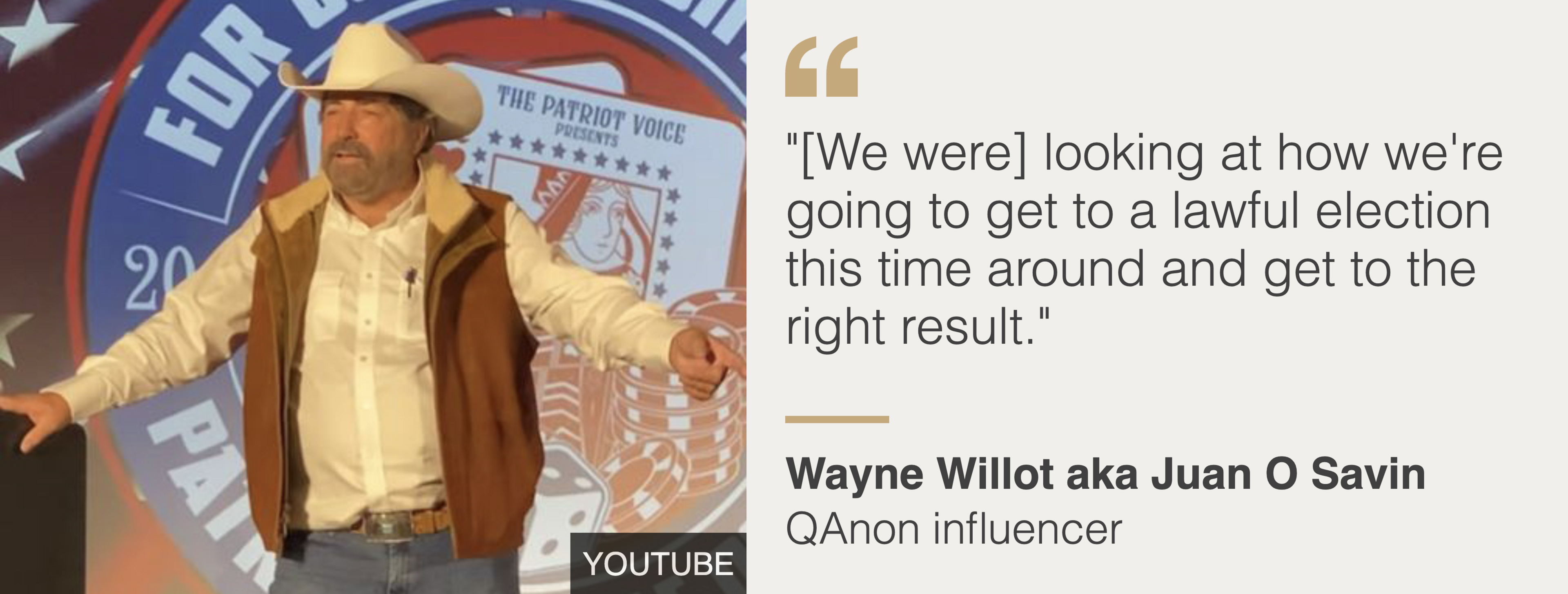
"QAnon has evolved into a very diffuse set of ideas that have really taken hold of the mainstream in many countries," says Melanie Smith head of the Digital Analysis Unit at the Institute of Strategic Dialogue. "This can no longer really be talked about as a fringe political movement."
Not only have false beliefs about the election process propelled political candidates, but they've also spilled over into real-world violence.
David DePape, the suspect in the attempted murder of Nancy Pelosi's husband Paul, wrote hundreds of conspiracy-themed blog posts on his personal website, including about the election.
Bret Schafer, the nonpartisan expert who monitors the state of democracies around the world, says that whatever happens on 8 November, the US will suffer.
If the coalition candidates are defeated, he says, they've primed their supporters to believe it can only have been because of fraud. If they're elected, they'll be a position of power to influence the result in 2024.
"Win or lose, this is going to lead to more people who doubt the integrity of our democracy."
Additional reporting by Kayleen Devlin
- Published5 October 2022
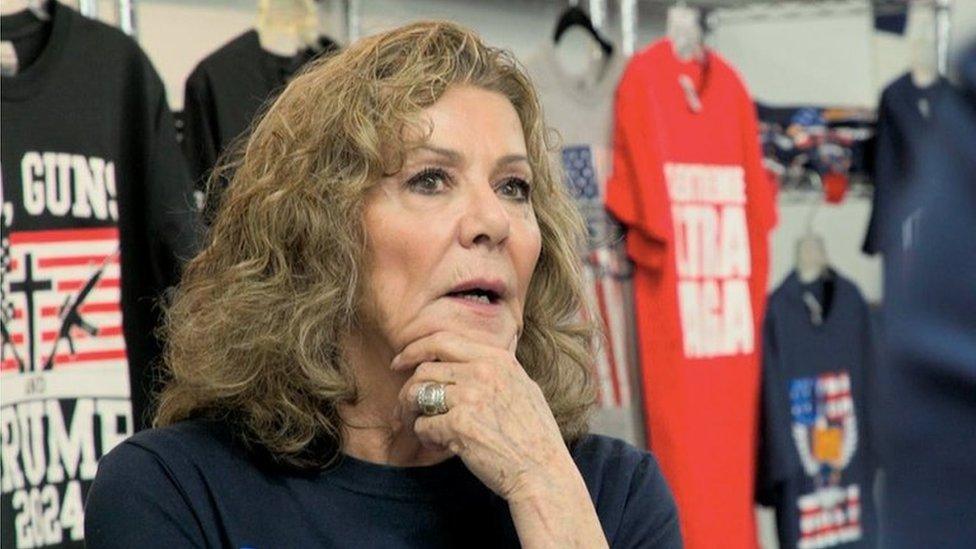
- Published1 November 2022
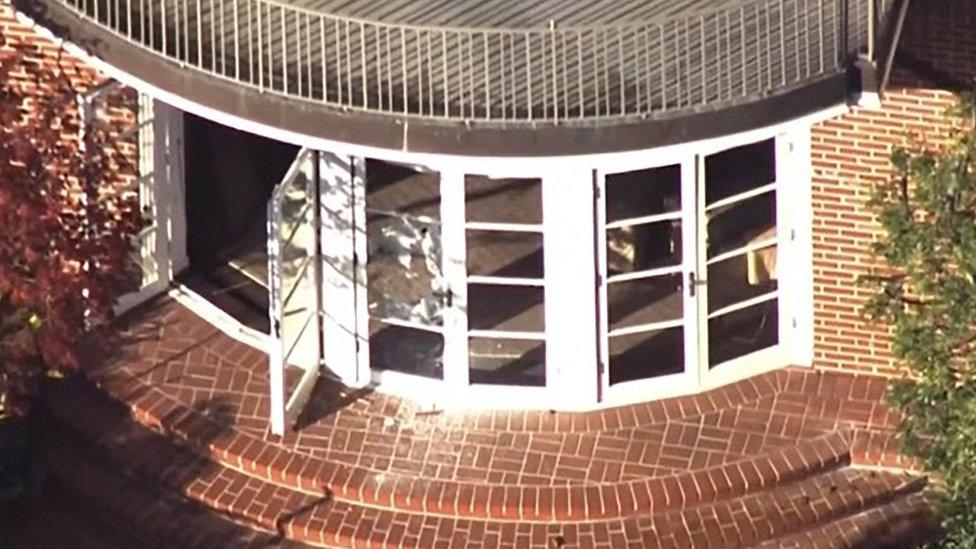
- Published6 January 2021
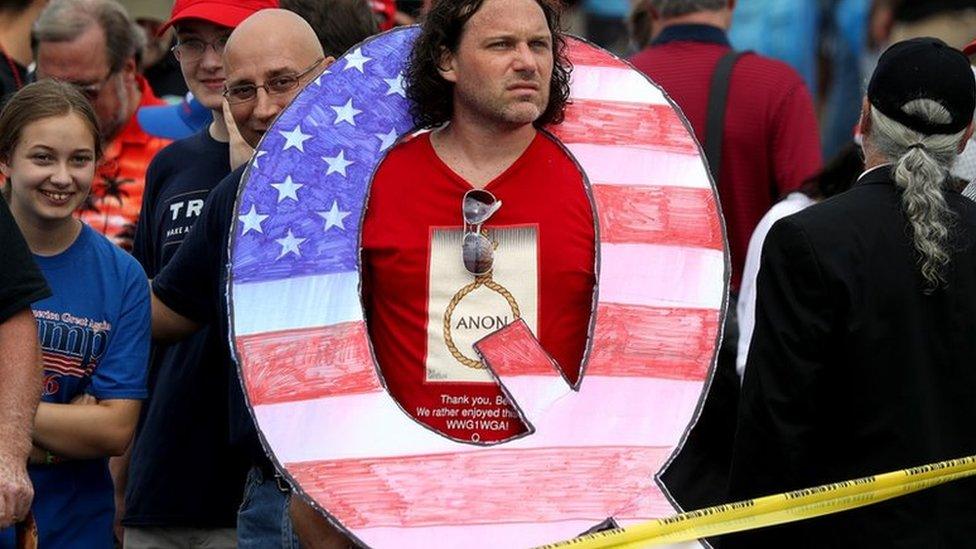
- Published10 January 2021
